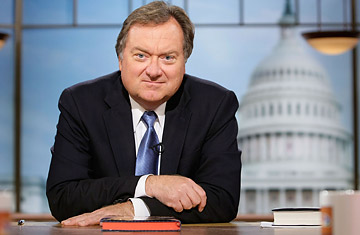
Tim Russert, NBC News' Washington bureau chief and the tremendously influential host of Meet the Press, died suddenly Friday afternoon. He died at age 58 of an apparent heart attack; he died in Washington, D.C.; and he died — unsurprisingly to anyone familiar with him — at work.
It only adds to the sadness of Russert's death that he passes away in the middle of a suspenseful presidential election, and one that again affirmed his standing as possibly America's most influential political journalist. On May 6, the night of the Indiana and North Carolina primaries, Russert declared on MSNBC, "We now know who the Democratic nominee's going to be." The pronouncement rocketed through the mediasphere and the campaigns themselves. As the New York Times reported shortly afterward, "The thought echoed throughout the world of instant political analysis, blocking the Clinton campaign's efforts to portray her slim victory in Indiana as an upset, as well as her camp's hopeful analysis that she still had a chance to convert superdelegates with triumphs in the races ahead."
The pronouncement was an example of Russert's absolute authority in the Washington media; it was also — to be fair, as Russert himself would point out — an example of some critics' concern that media figures were appointing themselves referees, calling the election before voters had. But the pronouncement turned out to be right — which one suspects is the judgment that Russert would care most about.
Of course, whether Russert died in the midst of an election year or not, the political and news worlds would have felt his loss. As host of Meet the Press, Russert established himself as the consummate Washington insider, but he drew much of his knowledge and authority from his roots outside the Beltway. He was born in 1950 in Buffalo, N.Y., and his Rust Belt, Catholic roots constantly and conspicuously informed his work. He wrote memorably about his Buffalo upbringing and his father's influence on him in his memoir Big Russ and Me. As one of his NBC colleagues, Lisa Myers, once said of him, "Buffalo is a critical secret to understanding him," and he himself cited his Jesuit education as critically formative.
The Jesuits are inextricably linked to questioning, and so was Russert. Meet the Press was an institution long before he came to it in 1991, but he made it his own by becoming known for aggressively questioning his Washington guests. In his trademark prosecutorial style — he earned a law degree before going to work as a political aide for New York Senator Patrick Moynihan in the 1970s — he held his guests to account for inconsistent past statements and doggedly followed up on evasions.
There was almost a kind of instinctual, animal acuity on display when Russert did an interview. He would lean forward, savoring what he took in, seeming to smell and taste the answers more than hearing them, picking up immediately and viscerally on the slightest off note. Russert earned plenty of detractors among those who felt that, on the one hand, he engaged in "gotcha" journalism, and on the other, he was too clubby with Washington insiders. But his Meet the Press was anything but toothless, and it became established as a required trial by fire for political leaders.
Any journalist as accomplished and prominent as Russert, of course, is bound to be criticized by people who wish that journalism and politics were different from what they are. But regardless, he was indisputably the master of politics and journalism as they are, intimately familiar with the levers of power and how they are wielded.
Russert is survived by Big Russ, whom he immortalized through his writing and broadcasts, and by his wife, writer Maureen Orth. He is also survived by former NBC anchor Tom Brokaw, who announced Russert's death on MSNBC this afternoon, his voice cracking, like a father prematurely saying goodbye to a journalistic son. "I think I can invoke personal privilege to say that this news division will not be the same without his strong, clear voice," Brokaw said. "He'll be missed as he was loved, greatly."
Later in the channel's coverage, Brokaw talked about how deeply Russert felt the pull of the politics he covered: "He really believed that politics are the DNA of this country." And just as inextricably, Russert is now part of the DNA of American political journalism.
